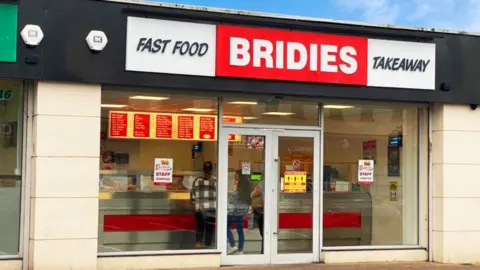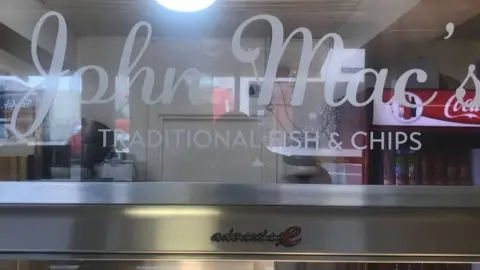Cost of living: Rising bills 'biggest crisis to hit NI takeaways'
 Nitat Termmee/Getty Images
Nitat Termmee/Getty ImagesRising costs for takeaway restaurants are the biggest crisis to hit the sector, the Northern Ireland Takeaway Association (Nita) has said.
More than 80 takeaways here have closed their doors in the past two months, according to the association.
Higher utility bills, food costs and business rates were some of the reasons for businesses shutting.
Nita's Michael Henderson said politicians needed to take swift and bold action to tackle the problem.
"This has been a tidal wave, a perfect storm of increased costs within our sector," he told BBC News NI.
"We have never experienced anything like this."
According to Nita, there are about 6,500 takeaways across Northern Ireland, including fast food outlets, delis and cafes.
Mr Henderson said about 10 of these takeaways were closing their doors each week due to high energy bills.
"The takeaway industry is a high energy-use industry," he said.
"It's not just one or two months, it's all-year round and it's crippling our businesses."
Increased food shortages and costs caused by Russia's invasion of Ukraine and VAT rates returning to pre-Covid levels have also pushed up business overheads, meaning it is no longer viable for takeaways to operate, Mr Henderson said.
'Heartbroken'
In August 2021, Gráinne Carson fulfilled a lifetime dream of opening her own bakery in west Belfast.
But on Saturday, the doors of Patisserie G on Beechmount Avenue closed for the final time.
Ms Carson said juggling the business's electricity bills with her own rising household costs forced her to close and let her staff go.
"We're still struggling [at home] and I can't struggle at work either," she told BBC News NI.
Ms Carson said she was "absolutely heartbroken" to be closing.
 Gráinne Carson
Gráinne CarsonInspired by the actions of Manchester United footballer Marcus Rashford, Ms Carson decided to start her own free breakfast club last September which was available to all children.
This scheme, alongside a summer book club and an entrepreneurs' club to teach young people life skills, are just some of the services the Beechmount community is losing.
"I grew up in the Troubles, so we had nothing and I just wanted the future generation to have something better, to have something different," she said.
"But the fear of the next bill coming in is terrifying."
Customers dropped into the shop with cards and flowers before it closed, with one describing it as being like a death in the community, Ms Carson said.
 Google
Google In County Londonderry, Paschal Lawrance and his family own four outlets of the well-known fish and chip takeaway Bridies.
While they currently have no plans to close, Mr Lawrance said they were "walking on a knife edge".
Reduced opening hours have also been introduced in some locations as a measure to cut energy bills.
Mr Lawrance said the business was now entering a quieter period, with children returning to school, and that there were difficult times ahead.
But while he described the situation as challenging, he is determined not to raise prices to keep his products affordable.
"We're not making the profits we used to make," he said. "We don't want to close and we've been keeping staff informed throughout."
Closed - for now
As another busy summer season wraps up in Newcastle, County Down, one popular fish and chips takeaway is shutting up shop until March 2023.
A staff member at John Mac's said that the price of gas, fish and packaging had tripled over the past few months, meaning it was no longer viable to keep the doors open this winter.
 John Mac's
John Mac's "Even the gas bill for one month was £3,000 - how do you sustain that?" they said.
Eight staff members are now left looking for new jobs heading into the winter.
"We're devastated," said the worker. "We have people of all ages who come down from Carrickfergus and Lisburn just to get their fish or goujon supper.
"You get to know the ones coming in, it's like a social life."
'Beyond critical point'
On 8 September, Prime Minister Liz Truss outlined plans to cap typical household energy bills at £2,500 for the next two years.
Businesses are also due to receive help under the Energy Bill Relief Scheme, with wholesale energy prices capped at "less than half" for six months.
Northern Ireland businesses are being promised an energy cap similar to that which has been announced for the rest of the UK.
Michael Henderson said a lack of clarity on how businesses in Northern Ireland can avail of support was causing uncertainty, adding that "tens of thousands of jobs" were on the line.
"This is now beyond critical point," he said.
"This is now about trying to prevent further damage."
